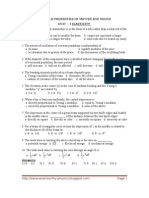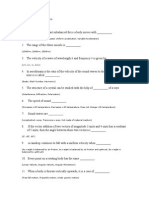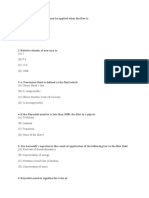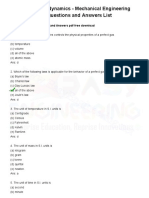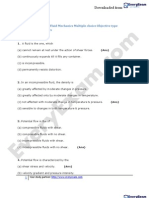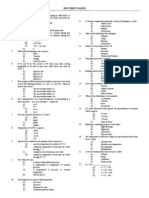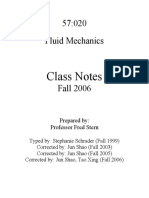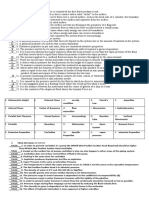Surface Tension Paper-1
Surface Tension Paper-1
Uploaded by
singamroopaCopyright:
Available Formats
Surface Tension Paper-1
Surface Tension Paper-1
Uploaded by
singamroopaOriginal Description:
Copyright
Available Formats
Share this document
Did you find this document useful?
Is this content inappropriate?
Copyright:
Available Formats
Surface Tension Paper-1
Surface Tension Paper-1
Uploaded by
singamroopaCopyright:
Available Formats
Published by: www.questionpapers.net.
in
SURFACE TENSION
w
w
w
.
q
u
e
s
t
i
o
n
p
a
p
e
r
s
.
n
e
t
.
i
n
Questions on Surface Tension, Paper 1
1. One end of a towel dips into a bucket full of water
and other end hangs over the bucket. It is found
that after some time the towel becomes fully wet.
It happens (CPMT 86)
(a) Because viscosity of eater is high
(b) Because of the capillary action of cotton
threads
(c) Because of gravitational force
(d) Because of evaporation of water.
Answer: (b)
2. For tap water and clean glass, the angle of contact
is
(a) 0 (b) 90
(c) 140 (d) 8
Answer: (d)
3. Water rises up to a height h
1
in a capillary tube of
radius r. the mass of the water lifted in the
capillary tube is M. if the radius of the capillary
tube is doubled, the mass of water that will rise in
the capillary tube will be
(a) M (b) 2M
(c)
2
M
(d) 4M
Answer: (b)
4. Water rises through a height h in a capillary tube
of internal radius (r). if T is the S.T. of water, then
the pressure difference between the liquid level in
the container and the lowest point of the concave
meniscus is
(a)
r
T
(b)
T
r
(c)
r
T 2
(d)
T 2
r
Answer: (c)
5.
A number of small drops of mercury coalesce
adiabatically to form a single drop. The
temperature of drop (MHT-CET-2008)
(a) Increases
(b) Is infinite
(c) Remains unchanged
(d) May decrease or increase depending upon size
Answer: (d)
6. The angle of contact between a glass capillary tube
of length 10 cm and a liquid is 90. If the capillary
tube is dipped vertically in the liquid, then the
liquid
(a) Will rise in the tube
(b) Will get depressed in the tube
(c) Will rise up to 10 cm in the tube and will over flow
(d) Will neither rise nor fall in the tube
Answer: (d)
7. When there are no external forces, the shape of a
liquid drop is determined by
(a) Surface tension of the liquid
(b) Density of liquid
(c) Viscosity of liquid
(d) Temperature of air only
Answer: (a)
8. If T is surface tension of soap solution, the amount
of work done in blowing a soap bubble from
diameter D to a diameter 2D is (PMT MP 90)
(a) 2 D
2
T (b) 4 D
2
T
(c) 6 D
2
T (d) 8 D
2
T
Answer: (c)
9. Choose the wrong statement from the following.
(a) Small droplets of a liquid are spherical due to
surface tension
(b) Oil rises through the wick due to capillarity
(c) In drinking the cold drinks through a straw,
we use the phenomenon of capillarity
(d) Gum is used to stick two surfaces. In this
process we use the property of Adhesion
Answer: (c)
10. If the surface of a liquid is plane, then the angle of
contact of the liquid with the walls of container is
(MHT CET 2004)
(a) Acute angle (b) Obtuse angle
(c) 90 (d) 0
Answer: (d)
11. A capillary tube when immersed vertically in a
liquid records a rise of 3 cm. if the tube is
immersed in the liquid at an angle of 60 with the
vertical, then length of the liquid column along the
tube will be
(MHT-CET 1999)
(a) 2 cm (b) 3 cm
(c) 6 cm (d) 9 cm
Answer: (c)
12. If sap bubbles of different radii are in
communication with each other (PMT MP 88,
NCERT 80)
(a) Air flow from the larger bubble into the
smaller one until the two bubbles are of
equal size
(b) The sizes of the bubbles remain unchanged.
(c) Air flows from the smaller into the larger on
and lager bubble grows at the expense of the
smaller one
(d) Air flows from the larger into the smaller one
becomes equal to that of the larger one and
the large one equal to that of the smaller
one.
Answer: (c)
Published by: www.questionpapers.net.in
SURFACE TENSION
w
w
w
.
q
u
e
s
t
i
o
n
p
a
p
e
r
s
.
n
e
t
.
i
n
13. A capillary tube of radius r can support a liquid of
weight 6.28 10
4
N. if the surface tension of the
liquid is 5 10
2
N/m. the radius of capillary must
be
(CPMT 88)
(a) 2.5 10
3
m (b) 2.0 10
4
m
(c) 1.5 10
3
m (d) 2.0 10
3
m
Answer: (d)
14. The work done in blowing a soap bubble of radius
R is W
1
and that to a radius 3R is W
2
. the ratio of
work done is
(a) 1:3 (b) 3:1
(c) 1:9 (d) 9:1
Answer: (c)
15. When the angle of contact between a solid and a
liquid is 90, then
(a) Cohesive force Adhesive force
(b) Cohesive force Adhesive force
(c) Cohesive force Adhesive force
(d) Cohesive force Adhesive force
Answer: (c)
16. Rain drops are spherical in shape because of
(MHT-CET 2000)
(a) Surface tension
(b) Capillary
(c) Downward motion
(d) Acceleration due to gravity
Answer: (a)
17. A sheet can be made water proof by coating it with
a substance that changes the angle of contact
(a)
2
to
(b) To zero
(c) From acute to obtuse
(d) From obtuse to acute
Answer: (c)
18. Water rises in a capillary tube to a certain height
such that the upward force due to surface tension
is balanced by 75 10
4
N, forces due to the
weight of the liquid. If the surface tension of water
is
6 10
2
N/m, the inner-circumference of the
capillary must be (CPMT 88, 86)
(a) 1.25 10
2
m (b) 0.50 10
2
m
(c) 6.5 10
2
m (d) 12.5 10
2
m
Answer: (d)
19. What is the change in surface energy, when a
mercury drop of radius R splits up into 1000
droplets of radius r?
(a) 8 R
2
T (b) 16 R
2
T
(c) 24 R
2
T (d) 36 R
2
T
Answer: (d)
20. Which of the following is not based one the
principle of capillarity (MHT CET 2005)
(a) Floating of wood on eater surface
(b) Ploughing of soil
(c) Rise of oil in wick of lantern
(d) Soaking of ink by bloating paper
Answer: (a)
21. The rise of a liquid in a capillary tube does not
depend upon
(a) Angle of contact
(b) Density of the liquid
(c) Radius of the capillary tube
(d) Atmospheric pressure
Answer: (d)
22. The height of water in a capillary tube of radius 2
cm is 4 cm. what should be the radius of capillary,
if the water rises to 8 cm in tube? (MHT-CET-
2001)
(a) 1 cm (b) 0.1 cm
(c) 2 cm (d) 4 cm
Answer: (a)
23. The work done to get n smaller equal size
spherical drops from a bigger size spherical size
drop of water is proportional to (EAMCET 91)
(a) 1
n
1
3
2
(b) 1
n
1
3
1
(c) 1 n
3
1
(d) 1 n
3
4
Answer: (c)
24. For a liquid, which is rising in a capillary tube, the
angle of contact is
(a) 90 (b) 180
(c) Acute (d) Obtuse
Answer: (c)
25. W is the work done, when a bubble of volume V is
formed from a solution. How much work is
required to be done to form a bubble of volume
2V?
(a) 2 W (b) W
(c) 2
1/3
W (d) 4
1/3
W
Answer: (d)
You might also like
- PR-3542 Community - LM Las Moritas - Community - LM Las MoritasDocument21 pagesPR-3542 Community - LM Las Moritas - Community - LM Las MoritasThe Community CoffeeNo ratings yet
- Fluid Mechanics Objective Questions For Mechanical EngineeringDocument5 pagesFluid Mechanics Objective Questions For Mechanical Engineeringrashik072No ratings yet
- Properties of Matter and SoundDocument6 pagesProperties of Matter and SoundsaravanamoorthyNo ratings yet
- Surface Tension QuestionsDocument4 pagesSurface Tension QuestionsSwarniv Chandra100% (2)
- 255 TOP FLUID MECHANICS Multiple Choice Questions and Answers PDFDocument38 pages255 TOP FLUID MECHANICS Multiple Choice Questions and Answers PDFahmish kabbaxeNo ratings yet
- All Units - MCQDocument47 pagesAll Units - MCQPrasanth S Assistant ProfessorNo ratings yet
- MCQ Questions For FMDocument45 pagesMCQ Questions For FMJAZEEL ALAVINo ratings yet
- AP Phys C Fall Final Web RevDocument12 pagesAP Phys C Fall Final Web RevNadhya FadlillahNo ratings yet
- MCQ On Basic PhysicsDocument57 pagesMCQ On Basic Physicsfreeuser3No ratings yet
- Mechanics MCQsDocument17 pagesMechanics MCQsbaig79100% (1)
- MCQDocument84 pagesMCQkamaliNo ratings yet
- Chemistry Lab ManualDocument51 pagesChemistry Lab Manualangel zoeNo ratings yet
- CHEM108 GuideDocument18 pagesCHEM108 GuidenadyahginiceNo ratings yet
- Quiz1 - Fluidmechanics1 (DDA80066)Document7 pagesQuiz1 - Fluidmechanics1 (DDA80066)silent spritsNo ratings yet
- Chemistry Unit 5 MCQ With AnswersDocument5 pagesChemistry Unit 5 MCQ With AnswersKaran VaswaniNo ratings yet
- Heat 200 McqsDocument41 pagesHeat 200 McqsParshantKumarBajaj100% (2)
- Porosity QuestionsDocument3 pagesPorosity QuestionsAtahan AltayNo ratings yet
- ThermodynamicsDocument12 pagesThermodynamicsSoham NagNo ratings yet
- MCQDocument5 pagesMCQAnonymous uTC8baNo ratings yet
- QB 16cv44Document14 pagesQB 16cv44Anu RaichurNo ratings yet
- Milling MCQsDocument10 pagesMilling MCQsmustafaNo ratings yet
- IMPORTANT MCQ-Heat Transfer 1 - WWW - ALLEXAMREVIEW.COM - PDFDocument19 pagesIMPORTANT MCQ-Heat Transfer 1 - WWW - ALLEXAMREVIEW.COM - PDFRobert Michael CorpusNo ratings yet
- Electronic Devices Objective Questions Answers 02Document2 pagesElectronic Devices Objective Questions Answers 02Vinayan K P100% (2)
- Sybpharm Sem Iii Physical Pharmacy I Practice Questions & Answer KeyDocument11 pagesSybpharm Sem Iii Physical Pharmacy I Practice Questions & Answer KeyMohd AzeemNo ratings yet
- Multiple Choice Questions On Fundamentals of Modelling (Unit-1)Document24 pagesMultiple Choice Questions On Fundamentals of Modelling (Unit-1)Pratik Kedare100% (1)
- MCQs On Fluid FlowDocument4 pagesMCQs On Fluid FlowRavi KantNo ratings yet
- Gas Dynamics MCQsDocument6 pagesGas Dynamics MCQsprawinlNo ratings yet
- Mechanical Engineering-Machine Design MCQDocument22 pagesMechanical Engineering-Machine Design MCQBala MetturNo ratings yet
- Mechanical Engineering Important MCQ PDF-Fluid Mechanics 1Document8 pagesMechanical Engineering Important MCQ PDF-Fluid Mechanics 1kibrom atsbhaNo ratings yet
- 300 Top Fluid Mechanics Multiple Choice Questions With Answers PDFDocument20 pages300 Top Fluid Mechanics Multiple Choice Questions With Answers PDFpiluNo ratings yet
- Thermodynamics Question BankDocument4 pagesThermodynamics Question BankOyedotun TundeNo ratings yet
- Unit 2nd McqsDocument26 pagesUnit 2nd McqsManav LekhiNo ratings yet
- Spacial Relativity McqsDocument14 pagesSpacial Relativity McqsMuhammad Noman Hameed100% (1)
- 152 TOP Thermodynamics - Mechanical Engineering Multiple Choice Questions and Answers ListDocument30 pages152 TOP Thermodynamics - Mechanical Engineering Multiple Choice Questions and Answers ListSampat AgnihotriNo ratings yet
- UPSC Chemical Engineering Fluid Mechanics Multiple Choice Objective Type Questions With AnswersDocument14 pagesUPSC Chemical Engineering Fluid Mechanics Multiple Choice Objective Type Questions With AnswersGerry Lou QuilesNo ratings yet
- Quantum Mechanics MCqsDocument19 pagesQuantum Mechanics MCqsalmasbashir001No ratings yet
- Chapter 4 Chemical Kinetics MCQsDocument25 pagesChapter 4 Chemical Kinetics MCQssarudarshinij.s123No ratings yet
- Genral Final With New QuestionsDocument83 pagesGenral Final With New QuestionsUttam Maurya100% (1)
- HMT MCQDocument6 pagesHMT MCQMr. Sudhir . J AdsulNo ratings yet
- MCQ Thermodynamics Compressible FlowDocument4 pagesMCQ Thermodynamics Compressible FlowTochi Krishna Abhishek100% (1)
- CH8701 Process Equipment Design MCQ 1Document3 pagesCH8701 Process Equipment Design MCQ 1Dhananjay PatilNo ratings yet
- MCQ of RACDocument7 pagesMCQ of RACMalav Purohit100% (1)
- MST MCQ U1Document8 pagesMST MCQ U1AyrenNo ratings yet
- Uhs Chemistry Most Repeated Mcqs 2008-2021-SolvedDocument59 pagesUhs Chemistry Most Repeated Mcqs 2008-2021-Solvedumairabbasumar786No ratings yet
- CE8302-Fluid-Mechanics Question With AnswerDocument59 pagesCE8302-Fluid-Mechanics Question With AnswerersnkrishnanNo ratings yet
- Micro-Project Report To Study of Compression Testing MachineDocument15 pagesMicro-Project Report To Study of Compression Testing MachineAkash BhorNo ratings yet
- SOM MCQ QuestionDocument14 pagesSOM MCQ QuestionRiddhi ValsangeNo ratings yet
- Multiple Question CHM 101Document26 pagesMultiple Question CHM 101Emmanuella OffiongNo ratings yet
- 250 TOP Fluid Mechanics - Mechanical Engineering Multiple Choice Questions and Answers List - MCQs Preparation For Engineering Competitive ExamsDocument35 pages250 TOP Fluid Mechanics - Mechanical Engineering Multiple Choice Questions and Answers List - MCQs Preparation For Engineering Competitive Examsl8o8r8d8s8i8v8No ratings yet
- Chemistry Mcqs For Ssc-IDocument5 pagesChemistry Mcqs For Ssc-IAbdul QayyumNo ratings yet
- Strength of Materials Engineering Kings Bits 1Document22 pagesStrength of Materials Engineering Kings Bits 1Sampath Siddam100% (1)
- Felows Specimen1Document2 pagesFelows Specimen1Ahmad Faraz Khan100% (2)
- Chapter 6 Mcqs Fluid DynamicsDocument5 pagesChapter 6 Mcqs Fluid Dynamicsleen praslaNo ratings yet
- KerogenDocument2 pagesKerogenAhmed Magdy Beshr100% (1)
- Bulking of SandDocument2 pagesBulking of SandAbdulelah SNo ratings yet
- Second Year Physics ObjectiveDocument51 pagesSecond Year Physics ObjectiveUsman Mustafvi100% (5)
- Quiz 1 PDFDocument7 pagesQuiz 1 PDFRuth MontebonNo ratings yet
- Mass TransferDocument43 pagesMass TransferJose Paolo MamuyacNo ratings yet
- Radiolysis of Water MCQ: Sarita Lalji Yadav Roll No-26 MSC I-Organic ChemistryDocument2 pagesRadiolysis of Water MCQ: Sarita Lalji Yadav Roll No-26 MSC I-Organic ChemistrySarita YadavNo ratings yet
- JEE - Physics - Surface TensionDocument20 pagesJEE - Physics - Surface TensionSanjana KumariNo ratings yet
- A103. ST BasicDocument4 pagesA103. ST Basickartikbansal2711No ratings yet
- Hindi Question PaperDocument3 pagesHindi Question PapersingamroopaNo ratings yet
- Bar #Include "Bar.h" #Include "Foo.h" Int Bar (Int X) (Return Foo (X) - 1 )Document1 pageBar #Include "Bar.h" #Include "Foo.h" Int Bar (Int X) (Return Foo (X) - 1 )singamroopaNo ratings yet
- Test-Libstl #Include #Include Int Main (Void) (Return 0 )Document1 pageTest-Libstl #Include #Include Int Main (Void) (Return 0 )singamroopaNo ratings yet
- (WWW - Entrance Exam - Net) Syllabus PGDocument110 pages(WWW - Entrance Exam - Net) Syllabus PGsingamroopaNo ratings yet
- Claim Form NewDocument5 pagesClaim Form NewsingamroopaNo ratings yet
- Admin Vehicle Info: Login ProcessDocument7 pagesAdmin Vehicle Info: Login ProcesssingamroopaNo ratings yet
- SW 8 QC ReportDocument4 pagesSW 8 QC ReportsingamroopaNo ratings yet
- Sizing Three Phase (Gas - Oil) Horizontal Separator: As Per API 12JDocument1 pageSizing Three Phase (Gas - Oil) Horizontal Separator: As Per API 12JekabudiartiNo ratings yet
- Physics 715 HW 3Document18 pagesPhysics 715 HW 3Juan Manuel Orozco HenaoNo ratings yet
- Science Test-Chapter 1 MatterDocument5 pagesScience Test-Chapter 1 MatterRentika Siahaan100% (2)
- Iapws95 2016Document19 pagesIapws95 2016Juan FranciscoNo ratings yet
- Calculations in Natural Gas CourseDocument6 pagesCalculations in Natural Gas CourseVijay KumarNo ratings yet
- No Symbol Term SI Unit Comment No Symbol Term SI Unit CommentDocument1 pageNo Symbol Term SI Unit Comment No Symbol Term SI Unit CommentVasti Diaz AguilarNo ratings yet
- EXP6 - Laminar and Turbulent Flow ReportDocument4 pagesEXP6 - Laminar and Turbulent Flow ReportPoochi DougNo ratings yet
- Matter in Our SurroundingsDocument15 pagesMatter in Our SurroundingsLogical airNo ratings yet
- C4-State of MatterDocument171 pagesC4-State of MatterLan FazlanNo ratings yet
- Properties of Dry GasesDocument27 pagesProperties of Dry GasesAlejandro PerezNo ratings yet
- Pump NPSHa and Suction and Delivery Line Head Loss CalculationDocument6 pagesPump NPSHa and Suction and Delivery Line Head Loss CalculationSugar Technology100% (1)
- Assignment 1 SMDocument23 pagesAssignment 1 SMpratikNo ratings yet
- Statistical Physics Phy632-Tutorial: Sharifah Hafizah Binti Syed Ab AzizDocument26 pagesStatistical Physics Phy632-Tutorial: Sharifah Hafizah Binti Syed Ab AzizSharifahHafizahAl-jufNo ratings yet
- Che 126 Separation Processes: Module 4 - AdsorptionDocument27 pagesChe 126 Separation Processes: Module 4 - AdsorptionAnthony Justin EdmaNo ratings yet
- Turbine Tip - Functional TestingDocument4 pagesTurbine Tip - Functional TestingRakesh GSNo ratings yet
- Purpose: The Purpose of This Document Is To Carry Out Hydraulic CalculationDocument14 pagesPurpose: The Purpose of This Document Is To Carry Out Hydraulic CalculationEkundayo John100% (1)
- NOTES Genchem 2 Lesson 6 Phase Diagram of Water and Carbon DioxideDocument8 pagesNOTES Genchem 2 Lesson 6 Phase Diagram of Water and Carbon Dioxidestephniedayao100% (1)
- General Vehicle AC TheoryDocument8 pagesGeneral Vehicle AC TheoryMarco Martinez DuranNo ratings yet
- Fluid Mechanics IDocument41 pagesFluid Mechanics IMALIK MUHAMMAD HAMZA FAROOQ MALIK MUHAMMAD FAROOQNo ratings yet
- Fluid Mechanics - Chapter 1Document19 pagesFluid Mechanics - Chapter 1Emre A100% (1)
- Cap 1 Problems 2017Document4 pagesCap 1 Problems 2017Juan DavidNo ratings yet
- Matlab Project 10Document4 pagesMatlab Project 10Kien LVNo ratings yet
- P Ch-12 Kinetic+Theory+of+GasesDocument2 pagesP Ch-12 Kinetic+Theory+of+Gasesmysoftinfo.incNo ratings yet
- ® Control Valve HBK - MasoneilanDocument36 pages® Control Valve HBK - Masoneilantucker-r100% (1)
- Kinetic Theory of Gases - JEE Main 2023 April Chapterwise PYQ - MathonGoDocument5 pagesKinetic Theory of Gases - JEE Main 2023 April Chapterwise PYQ - MathonGoHeemani KNo ratings yet
- J - 1. Bernoulli's 1738 Classic Treatise Is Considered The First Fluid Mechanics TextDocument3 pagesJ - 1. Bernoulli's 1738 Classic Treatise Is Considered The First Fluid Mechanics TextLalunio Catapang JayveeNo ratings yet
- ( (Diffusion) ) : Chapter (10) in VolumeDocument9 pages( (Diffusion) ) : Chapter (10) in Volumeashwaq100% (1)
- Chemistry g11Document2 pagesChemistry g11Madelleine PaduaNo ratings yet
- Emerson Flow Meter Technical Size - TatweerDocument1 pageEmerson Flow Meter Technical Size - TatweerZidan ZeusNo ratings yet


